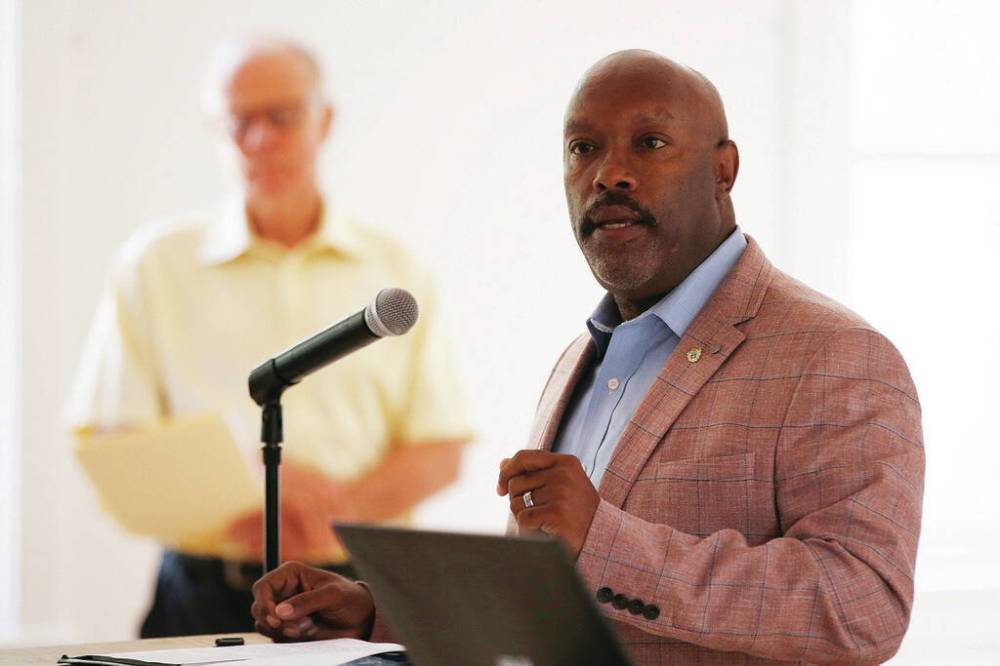Chambers seeks developer tax break linked to sewage capacity enhancements
Advertisement
Read this article for free:
or
Already have an account? Log in here »
To continue reading, please subscribe:
Monthly Digital Subscription
$19 $0 for the first 4 weeks*
- Enjoy unlimited reading on winnipegfreepress.com
- Read the E-Edition, our digital replica newspaper
- Access News Break, our award-winning app
- Play interactive puzzles
*No charge for four weeks then billed as $19 plus GST every four weeks. Offer only available to new and qualified returning subscribers. Cancel any time.
Read unlimited articles for free today:
or
Already have an account? Log in here »
Hey there, time traveller!
This article was published 26/04/2022 (975 days ago), so information in it may no longer be current.
A new tax break could be on the way to reimburse Winnipeg developers whose projects might otherwise be scaled back or stalled due to limited sewage capacity.
Coun. Markus Chambers is calling for the city to study options to compensate developers of large-scale multi-family structures when they pay for sewage upgrades instead of delaying or downsizing projects to fit aging or inadequate infrastructure.
The St. Norbert-Seine River councillor said a few projects have now been delayed or scaled back in his ward, after proponents learned plans would exceed existing sewage capacity in the area. He said paying for the upgrades, with no city compensation, can cost the companies tens (or hundreds) of thousands of dollars.

“Developers are saying, ‘I can’t add that cost for something I don’t own,’ so they leave their property vacant… and it’s impacting our ability to create jobs, to build housing (that is) so desperately needed,” Chambers said Wednesday.
The motion doesn’t dictate a specific form of tax break. Chambers suggests the City of Winnipeg could waive a portion of annual property taxes over a 10-year period to compensate developers who enhance sewage capacity to support specific large housing projects.
“After the 10 years, the city walks away with brand-new infrastructure, housing and then starts collecting the entire (tax bill),” he said.
Chambers said he believes the tax break would help the city increase housing density for infill projects that might otherwise be limited by sewage capacity.
“This is a prime example of where we can work collaboratively and get new infrastructure and not stagnate development.”
Tom Peake said the change would help him move forward on a new housing plan, which he expects would add an 85-suite apartment block or 34 condos in St. Norbert.
He’s discussed ideas to develop his 1.9-acre property on Grandmont Boulevard (near its intersection with Pembina Highway) with the city for nearly two years. He has yet to complete a formal proposal for the project after learning existing city sewage capacity wouldn’t support either option.
“I’ve got a site that I can’t do anything with… I can’t do (detailed) plans and there’s no point hiring an architect until I know they can provide service for sewer,” said Peake, president and owner of X Hale Corporation Inc.
He expects the tax break described by Chambers would be enough to push his project forward and help entice other developments. “If they pay it back to me over 10 years, I’ll finance it. It makes complete sense.”
Should such a deferral motion succeed, Peake expects the city would still greatly benefit from the tax dollars new multi-family projects generate. In his case, he expects his property taxes would rise from $22,000 per year (for the vacant land) to between $150,000 and $180,000, once construction is complete.
During a Riel community committee meeting Tuesday, a representative of End Homelessness Winnipeg also supported the motion — in hopes the changes would help entice developers to build more housing units, including affordable ones.
“We’re happy to see the city looking creatively at the tools… that can really facilitate the development of new affordable rental housing in our city,” said Lissie Rappaport, manager of housing supply.
Rappaport said developers have told End Homelessness old infrastructure, including sewage lines, has sometimes led them to produce fewer housing units to avoid expensive upgrades.
“When they have to put those large investments into the redevelopment of these lots… it just becomes inaccessible for them to finish these developments. So, they often will abandon their plans to do a three- or four-plex and just convert (the lot) into a single detached house,” she said.
The Riel committee approved the call for a report on potential tax changes. It next requires a vote at council’s property and development committee.
joyanne.pursaga@freepress.mb.ca
Twitter: @joyanne_pursaga

Joyanne Pursaga
Reporter
Born and raised in Winnipeg, Joyanne loves to tell the stories of this city, especially when politics is involved. Joyanne became the city hall reporter for the Winnipeg Free Press in early 2020.
Our newsroom depends on a growing audience of readers to power our journalism. If you are not a paid reader, please consider becoming a subscriber.
Our newsroom depends on its audience of readers to power our journalism. Thank you for your support.


